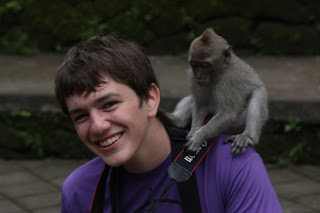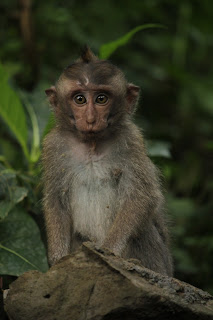
4/17/11 (Jimbaren, Bali) From our base in frenetic Ubud, we joined a mountain bike tour to visit the countryside. In the cool, early morning a minibus drove us high to the crater rim for breakfast overlooking Lake Batur. From the true summit across the crater dropped a tongue of black aa laval, but the vigorous vegetation were creeping their way into the desolation.
After breakfast, our fantastic, informative and funny guide Joe led off on bikes. We whizzed down tiny 'roads,' dodging potholes, thru small villages in a freespirited and festive mood; children lined the street to slap hands, shouting "Cho!" Soon we left the pavement for a dirt track through the ricefields. A network of irrigation canals, ditches and troughs ensured that water never left us. Gurgling cheerfully, it seemed to help celebrate the day.

Joe punctuated the ride with interesting diversions - helping a farmer plant emerald rice shoots in the wet, oozing mud, visiting a family compound to see traditional rhythms of life, exploring the crevices of a mamoth Banyan tree, and trying our hands at harvesting rice alongside a group of elderly women. The trip ended with a fabulous Balinese feast - a perfect day.















































